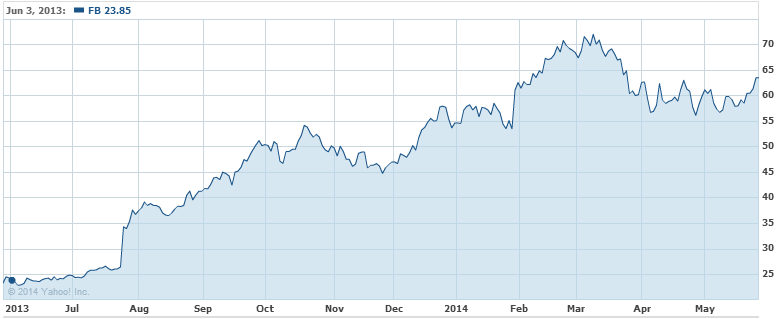Facebook (Nasdaq: FB) stock has climbed 161% in just one year. That's a great reversal from its 53% tumble the first three months of trading.
 Facebook stock's rebound is one reason investors were praising Facebook Founder and Chief Executive Officer Mark Zuckerberg at the recent FB shareholder meeting. Zuckerberg has shown investors he's able to make some savvy purchases, too, with FB's recent buying spree.
Facebook stock's rebound is one reason investors were praising Facebook Founder and Chief Executive Officer Mark Zuckerberg at the recent FB shareholder meeting. Zuckerberg has shown investors he's able to make some savvy purchases, too, with FB's recent buying spree.
But Facebook is now facing something that Zuckerberg may not be able to maneuver around so easily...
A judge in southern Iran has summoned the social media magnate to appear in court to answer individuals' complaints that allege Facebook-owned apps Instagram and WhatsApp violate their privacy.
Chances of Zuckerberg actually appearing in an Iranian court are slim to none, as no extradition treaty between Iran and the United States exists. Still, the Middle East country is sending a clear message with the court order that Facebook and its offshoots are not welcome there.
Just last week, another Iranian court ordered Instagram blocked over privacy concerns.
While Facebook is already officially banned in Iran, scores of its tech-savvy citizens have found ways to bypass controls and access the forbidden social media site.
The Iranian court order came on the heels of some disturbing news reported last week by the International Business Times.
Facebook will use an upcoming mobile app to amass, analyze, and store data (songs and TV shows) captured by smartphones' microphones.
While Facebook assured users that "no sound is stored" by the new feature, the world's largest social media site acknowledged to IBTimes that "data is saved, but all data is anonymized and aggregated."
It's not clear what FB plans to do with the all the sound bites. That in itself is bothersome.
"I think the most problematic element of this is that we don't know with what data the sounds are matched," said Dr. Ilka Gleibs, Professor of Social and Organizational Psychology at the London School of Economics. "As consumers, we have no control over whether data could be de-anonymized or what happens if third parties would like access to the data. It's difficult to trust when messages are so mixed and we deal with so many unknowns."
That's why Iran isn't the only government concerned about FB and privacy...
FB Hits Problems: FTC Calls for Transparency and Accountability
A new report filed by the Federal Trade Commission (FTC) Tuesday outlined how data broker companies collect and share their massive amounts of consumer information - and hide it from watchdogs.
The FTC data points out that while consumers sometimes benefit from data brokers, which run the gamut from Division of Motor Vehicle Agencies to retailers to social media sites, industry practices raise a slew of privacy concern issues.
"The extent of consumer profiling today means that data brokers often know as much - or even more - about us than our family and friends, including our online and in-store purchases, our political and religious affiliations, our income and socioeconomic status, and more," FTC Chairwoman Edith Ramirez said during a media call Tuesday. "It's time to bring transparency and accountability to bear on this industry on behalf of consumers, many of whom are unaware that data brokers even exist."
A key concern of the plethora of information collected by data brokers is that it's an attractive target for hackers and identify thieves. Unquestionably, data collection is risky business for consumers. Yet it's a very lucrative business - especially for Facebook, the "Big Dog of the Mobile Ad Space."
Facebook has been dealing with calls for more transparency and accountably regarding privacy issues since its inception.
But, the good news for investors: Business hasn't suffered. In fact, Facebook is thriving.
FB Stock Keeps Climbing
Privacy concerns have been around for years, and Facebook has still doubled its stock price - and kept going.
The Menlo Park, Calif.-based company reported blockbuster Q1 2014 numbers last month. The social networking leader delivered on earnings, revenue, mobile ad growth, and member user count.
"Facebook's business is strong and growing, and this quarter was a great start to 2014," Zuckerberg said in a statement. "We've made some long term bets on the future while staying focused on executing and improving our core products and business. We're in great position to continue making progress towards our mission."
Top on that mission list is connecting the world via Facebook. Part of the plan is also rewarding shareholders.
Money Morning Defense & Tech Specialist Michael A. Robinson thinks shares are heading upwards of $150 to $200 a share.
And in a recent report from Zacks Equity Research - which rates FB stock a "Buy" - analysts wrote they believe Facebook's "growing mobile user base, Instagram's increasing popularity, the frequent launching of new products and international expansions will boost the company's top line and profitability going forward."
Zacks cited eMarketer's projection that FB's mobile ad revenue will rise to 63.4% of net ad revenue in 2014, from 45.1% in 2013.
Facebook is also looking at ways to enhance user engagement.
Even amid all the chatter over privacy concerns, FB stock rose about 0.03 points on Wednesday and traded up 0.22% at $63.65 in premarket trading Thursday.
Today's Top Investing Story: Many investors believe that with our presence in Iraq largely gone, defense tech firms will offer mediocre returns at best. But they couldn't be more wrong. This defense tech play is scorching the market...
Related Articles:


